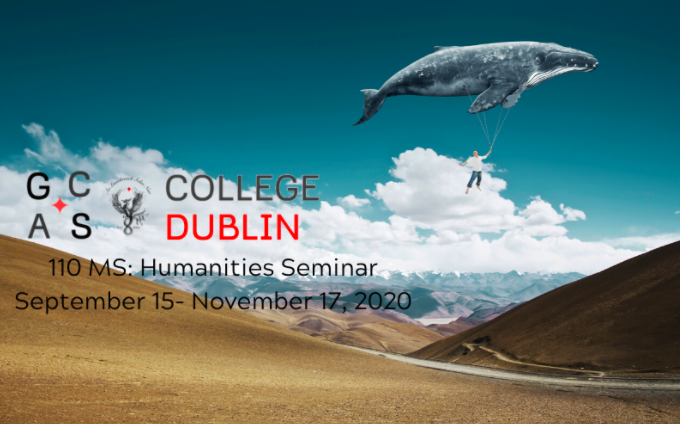Humanities
110 Major Seminar Fall 2020
7 Credits
BA
Humanities Seminar
Team Taught: Ekaterina Filippova, MA, Susannah Livingston, PhD, Firoz Manji, PhD, Francisco Gonzalez, PhD, Khanyile Mlotshwa, MA, Alexandria Gabbard, PhD, Mark Stimson, MA, Helen Rollins, MA, Creston Davis, PhD
Meeting Times
Dates: September 15 - November 17, 2020
Days: Tuesdays and Thursdays 5-7PM EST
Course Requirements
Read assigned texts
View pre-discussion recordings before attending the conversation/discussion live sessions.
Complete the assignments
Technology and Environment
Students will need to have a computer and access to the internet, and to Zoom (free to download here: https://zoom.us). The mobile phone zoom app will work as long as the student has a way to use it hands free (we may need both our hands to make sound!). Students will also need a private, relatively quite space, to attend meetings, in order to make sound in uninhibited ways.
Assessment
Participation/Attendance
Raising questions and engaging with the course materials
Final Research Paper of 2,000 words and/or a GCAS Magazine Article of 1,500 words.
Faculty and Schedule:
September 15 and 17: Creston Davis, PhD Introduction to the Course
September 22 and 24: Ekaterina Filippova, MA (Psychology)
September 29 and October 1: Susannah Livingston, PhD (Education)
October 6 and 8: Firoz Manji, PhD (African Studies and History)
October 13 and 15: Francisco Gonzalez, PhD (Art)
October 20 and 22: Khanyile Mlotshwa, MA (African Studies and History)
October 27 and 29: Alexandria Gabbard, PhD (Literature)
November 3 and 5: Mark Stimson, MA (The Human and the Environment)
November 10 and 12: Helen Rollins, MA (Film and Psychoanalysis)
November 17: Creston Davis (Conclusion)
BA Seminar
Description:
This course is co-taught by GCAS College faculty and guest speakers. This course is also, in part, co-taught by the students via peer-group work.
This course will introduce students to the significance of the humanities, which is defined as the academic evaluation of the human reflection and recording of all aspects of human life from religion, philosophy and art, to architecture, culture, and drama among other aspects. In this regard, the Humanities also encompasses the sciences both social (anthropology, sociology, psychology) and the so called “hard” sciences (biology, physics, chemistry) and even business insofar as they are the cultivation of and have effects on human activity. In addition to a general overview of the Humanities, this course will cover various methods and approaches to how we understand and engage in the human cultivation of our life on earth. This course will be broken down into 9 modules including:
Introduction to the Course: What is the “Humanities”?
Psychology
Education
African Studies and History
Art
African Studies and History
Literature
The Human and the Environment
Film & Psychoanalysis
Thus, this course is designed to introduce the wide-ranging topics which together compose the Humanities, with the aim to understand and frame one's own self within the historical context of the unfolding story called the “Human.”
Academic Level: Year 1 Bachelor
Prerequisites: High School Degree or permission from the Chancellor’s Office
Required Texts: Course Packet
Learning and Teaching Methods:
Blended Learning (online/ in person) consisting of lectures, discussions, small group work, supervising, peer-group, student presentation.
Intended Learning Outcomes:
- Ability to understand the basic structure, content and importance of the humanities especially in relationship to how humans describe, acquire and use knowledge of the external world toward different ends.
- Ability to engage texts and conversation critically and coherently
- Ability to communicate clearly and analytically about all the major themes and sub-themes that comprise this course
- Ability to understand the social and ecological consequences of different technological developments and their uses to which humanity has employed them.
Assessments:
The student will be assessed in all aspects of this course through the following means:
Presentation
Journals
Quizzes
Participation
Article for the GCAS Review
For the student to advance through each module they must first pass a quiz and demonstrate they have grasped the learning outcomes. Should a student fail a module quiz they will not advance to the next module and thus be dropped from the course. A student can retake a quiz should they fail to meet the standard.
Grading Scale:
10 Excellent, 9 Very Good, 8 Good, 7 Satisfactory, 6 and below is Fail
Accommodations:
Please inform us if you need any assistance @contact@gcas.ie
Take this Course for Credit: Tuition Cost 585€
If you are taking this course for 7 Credits, please contact GCAS so we can provide you with the syllabus at contact@gcas.ie
Refund:
You may have a full refund if after the first class session you would like to drop out of the course. After the second session, there is no refund.
Earn GCAS Crypto-Tokens:
Once the participant completes this program, they can claim 125 GCAS Tokens “GCASY” via our Crypto Hub.
Specific Instructions: Once you have enrolled, you will be assigned a gcas.ie email and APP account, which is Google based. You must activate your account to access the course’s platform.

